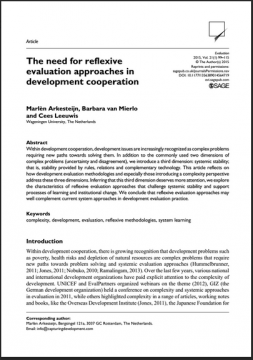The need for reflexive evaluation approaches in development cooperation


Abstract
Within development cooperation, development issues are increasingly recognized as complex problems requiring new paths towards solving them. In addition to the commonly used two dimensions of complex problems (uncertainty and disagreement), we introduce a third dimension: systemic stability; that is, stability provided by rules, relations and complementary technology. This article reflects on how development evaluation methodologies and especially those introducing a complexity perspective address these three dimensions. Inferring that this third dimension deserves more attention, we explore the characteristics of reflexive evaluation approaches that challenge systemic stability and support processes of learning and institutional change. We conclude that reflexive evaluation approaches may well complement current system approaches in development evaluation practice.
Suggested citation
Arkesteijn. M, van Mierlo. B, and Leeuwis. C, 2015, The need for reflexive evaluation approaches in development cooperation,Evaluation,21(1), 99-115.
(0) Comments
There is no content